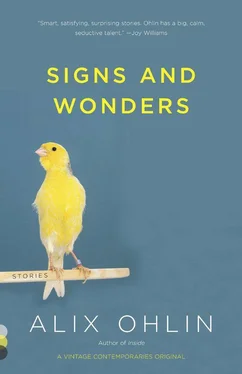Alix Ohlin - Signs and Wonders
Здесь есть возможность читать онлайн «Alix Ohlin - Signs and Wonders» весь текст электронной книги совершенно бесплатно (целиком полную версию без сокращений). В некоторых случаях можно слушать аудио, скачать через торрент в формате fb2 и присутствует краткое содержание. Год выпуска: 2012, ISBN: 2012, Издательство: Random House, Inc., Жанр: Современная проза, на английском языке. Описание произведения, (предисловие) а так же отзывы посетителей доступны на портале библиотеки ЛибКат.
- Название:Signs and Wonders
- Автор:
- Издательство:Random House, Inc.
- Жанр:
- Год:2012
- ISBN:9780307948649
- Рейтинг книги:3 / 5. Голосов: 1
-
Избранное:Добавить в избранное
- Отзывы:
-
Ваша оценка:
- 60
- 1
- 2
- 3
- 4
- 5
Signs and Wonders: краткое содержание, описание и аннотация
Предлагаем к чтению аннотацию, описание, краткое содержание или предисловие (зависит от того, что написал сам автор книги «Signs and Wonders»). Если вы не нашли необходимую информацию о книге — напишите в комментариях, мы постараемся отыскать её.
Signs and Wonders — читать онлайн бесплатно полную книгу (весь текст) целиком
Ниже представлен текст книги, разбитый по страницам. Система сохранения места последней прочитанной страницы, позволяет с удобством читать онлайн бесплатно книгу «Signs and Wonders», без необходимости каждый раз заново искать на чём Вы остановились. Поставьте закладку, и сможете в любой момент перейти на страницу, на которой закончили чтение.
Интервал:
Закладка:
“Cats usually like me,” he said.
We were all drunk. It was so cold in the apartment I wished I’d brought a sweater, which seemed ridiculous given that the night before I’d emptied a tray of ice cubes into my pillowcase before finally falling asleep.
“You’re so pretty,” the grad student said to Sarah, who was lounging on the couch with a cat wedged between her ankles. “What are you into?”
“Leftist bohemians with wealthy relatives,” Millie answered for her, and laughed. Sarah didn’t say anything. “Guys with intellectual rather than physical brawn.”
“You’re a bitch,” he said.
“It’s not true,” I said.
“Of course it’s not true,” Millie said. “It’s never true.”
“Anyway, you’re the one with wealthy relatives ,” the guy said, pronouncing it like a swear, and I realized they had some kind of history, that maybe Millie was into him, or had been, and that’s why she was so mad.
Martin looked up as their voices got louder and said, “Hey, now. Come on.” Because he was drunk, his Southern accent was stronger than usual. “Everybody calm down.”
“Shut up, Martin,” Millie said casually. She was still looking at the grad student, her eyes practically shooting out sparks.
Martin’s whole face buttoned, closed itself like an envelope. His blue eyes went vacant. Then he did an odd thing. He put one hand on the floor, as if to brace himself in order to stand up, then curled the palm of his other hand around Millie’s ankle, grasping it as tightly as a bar in the subway. She looked down at him, surprised, but he was focused on his own operation and didn’t say anything. Drawing his face close to her knee, he stuck out his tongue and licked it — more than once, quite thoroughly, as if he were cleaning it. As if he were a cat.
I remember Millie staring at me, eyes wide and frozen, wondering what she was supposed to do.
I remember our host laughing, a shrill squeal like a girl’s.
Then Martin said, “Gotta go.” He unfurled his tall frame, bowed slightly to everyone, and left the apartment.
“What the hell was that?” Sarah said.
At first it seemed like just another night when something weird happened, like the time when Sarah and I left the office at dusk and a guy in a gorilla suit came up and gave me a hug, or the day in Tompkins Square Park when we met some backpackers from Denmark who’d run out of money, and we bought them lunch and they thanked us by performing Scandinavian folk songs until other people in the park told them to go away.
The next day, Sunday, Sarah and I had a picnic in the park, if you can call two bagels and the New York Times a picnic, then on Monday we went back to work, and it was probably Thursday or Friday before we realized that nobody had heard from Martin.
“I should call him,” I said to Sarah in the office, my hand hovering over the phone. She shrugged. I left him a message, but he didn’t call back. I guessed he was embarrassed, and lying low for a while.
Millie told us that she thought the whole thing was funny. “I was talking,” she said, “and I felt something wet, and I thought it was some wine or something. But then I looked down and … I couldn’t really take it in, you know? It was like my brain couldn’t absorb what was happening. And before I could even say anything, it was over!”
They both keeled over laughing, and then Sarah made us go to the bar in Chelsea so we could tell the story all over again, to her roommate.
“But so nobody’s heard from him?” I said.
“He must be mortified,” Sarah said.
We gave him some time: that week, and the week after. Then one day at work I called his office, and his voice mail didn’t pick up. His phone at home was disconnected, too.
I looked over at Sarah. “Martin’s gone,” I said.
As soon as I said it I felt it was true. Sarah must have heard it in my voice; for the first time since that night, she didn’t laugh when she heard his name.
We called Millie, and she invited us over to her apartment that evening to discuss the situation. This was when we saw how nice it was. Her place reminded me of a story I’d heard about an assistant at Condé Nast. “I assume you have other income,” the person interviewing her had said, because the salary was so low. At the time, I interpreted that story as having to do with the cluelessness of bosses. But I understood now it was true, true of Millie and other assistants all over the city, that for some of us this life was a game, and for some of us it wasn’t. I felt duped, although no one had lied to me. I just hadn’t known.
Millie handed us each a beer and we sat around on her Pottery Barn furniture.
“Wow, you have a balcony,” Sarah said. “That’s great.”
“It’s tiny,” Millie said, dismissing it with a wave of her hand.
There was a new awkwardness between us that wasn’t just due to the apartment. It had to do with our understanding how Martin felt about Millie and how she’d enjoyed stringing him along, letting him hope for something that was never going to happen.
It turned out that none of us knew any of his other friends. He’d briefly dated my friend Kim, but when we called her she said she hadn’t spoken to him in months. After a few more beers, we decided to go his place. He lived on a shabby block in the East Twenties, and we’d only been there once before, when we were walking home from the movies and somebody had to go to the bathroom. We hung out on his stoop for a while and kept ringing his buzzer. No one answered. Eventually, because of the beer, we had to find a bathroom somewhere else.
There were no stories in the news about anyone fitting Martin’s description getting in trouble, or injured, or dying. There was never any news of him at all. He was just gone. I had a hard time accepting that someone we’d hung around with so much could simply vanish. Every once in a while I’d call his numbers or ring his buzzer, but there was never any trace of him. Sometimes I’d ask Sarah where she thought he went and if he was all right, but she never wanted to speculate. She’d give me an odd, weary look, as if my concern was naïve. “If he wanted to be in touch, he’d be in touch,” she said.
So I stopped bringing it up. Occasionally I thought about our weird conversation about his funeral. But even in retrospect it didn’t strike me as morbid. This was how Martin was — he wasn’t afraid to ask a strange question or make a peculiar gesture. It was a way for him to figure out where he stood with you. I guessed he’d wanted that with Millie, too. He must have gotten his answer.
For whatever reason, after Martin went away the rest of us stopped calling one another so much. What had felt like a tight, permanent pack turned out to be loose and temporary. We still met up, just not as often, and the daily phone check-ins slowed to a trickle. Millie got a new, serious boyfriend. Sarah’s roommate left the city for grad school. She and I buckled down at work. We stopped talking about the titmouse and laughing so much at the office.
One day, without warning, Eric died. Janet called and said, “He had a massive heart attack! They found him in bed. It’s going to be a mess cleaning that place up, I think he kept the accounts in a shoe box under his bed or something. Anyway, you should probably take the day off. Take the week.”
I hung up. Sarah was bent over her desk, her shiny black hair brushing the manuscript pages she was reading. Her hands were clasped over her ears, as they always were when I was on the phone.
“Eric’s dead,” I said.
“Yeah, right.”
“No, seriously.”
“Yeah, right.”
“Janet just told me.”
She looked up and shook her head slightly, as if shaking herself awake. Then, to my surprise, she burst into tears. I reached over and hugged her. We huddled there together, like little kids.
Читать дальшеИнтервал:
Закладка:
Похожие книги на «Signs and Wonders»
Представляем Вашему вниманию похожие книги на «Signs and Wonders» списком для выбора. Мы отобрали схожую по названию и смыслу литературу в надежде предоставить читателям больше вариантов отыскать новые, интересные, ещё непрочитанные произведения.
Обсуждение, отзывы о книге «Signs and Wonders» и просто собственные мнения читателей. Оставьте ваши комментарии, напишите, что Вы думаете о произведении, его смысле или главных героях. Укажите что конкретно понравилось, а что нет, и почему Вы так считаете.












